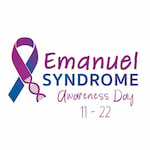Emanuel Syndrome Awareness Day Date in the current year: November 22, 2026
 Emanuel Syndrome Awareness Day is observed annually on November 22. It was created to raise awareness of a rare genetic disorder caused by a translocation between chromosomes 11 and 22, which results in multiple congenital abnormalities.
Emanuel Syndrome Awareness Day is observed annually on November 22. It was created to raise awareness of a rare genetic disorder caused by a translocation between chromosomes 11 and 22, which results in multiple congenital abnormalities.A chromosomal translocation occurs when a fragment of one chromosome becomes attached to another chromosome. It can be balanced or unbalanced. In a balanced translocation, the fragments of two chromosomes switch places, but there is no loss or gain of genetic material, so it has no serious effect on the body. An unbalanced translocation occurs when the switch results in the loss or gain of genetic material, which can lead to developmental issues and health problems.
Patients with Emanuel syndrome have an unbalanced translocation between chromosomes 11 and 22, which is characterized by the presence of extra genetic material. A fragment of chromosome 11 is attached to a fragment of chromosome 22, resulting in an extra chromosome called derivative 22, or der(22). This chromosome is usually inherited from an unaffected parent with a balanced translocation that becomes unbalanced when passed to the child.
Emanuel syndrome affects multiple organs and systems in the body and causes characteristic facial features and various health issues. Common facial features include a prominent forehead, widely spaced eyes (hypertelorism), downward-slanting eyelids, a broad nasal bridge, a flat midface, a small jaw (micrognathia), and large or unusually shaped ears. These features often occur alongside other physical abnormalities, such as microcephaly (a small head), a cleft palate, or dental issues.
Infants with Emanuel syndrome fail to grow and gain weight at the expected rate and have weak muscle tone. Other signs and symptoms include severe developmental delay, intellectual disability, delayed or absent speech, seizures, congenital heart defects, kidney or urinary tract anomalies, gastrointestinal issues, recurrent infections, and genital and skeletal abnormalities.
Like most genetic disorders, Emanuel syndrome is currently incurable. Treatment focuses on alleviating symptoms and improving quality of life. It typically requires a multidisciplinary team and may include physical and occupational therapy, speech and language therapy, and assistive devices, such as mobility aids. Medications may be prescribed to control seizures, if present, and medical or surgical care may be necessary to address heart or kidney defects. Patients with Emanuel syndrome require regular monitoring by specialists to prevent or promptly address complications.
Life expectancy varies depending on the severity of associated medical problems, especially heart and kidney defects. While some infants with severe complications may not survive early childhood, many children live into adolescence or adulthood with appropriate medical care and supportive therapies. Most individuals require lifelong assistance.
Emanuel Syndrome Awareness Day is observed on November 22 (11/22) because the syndrome affects chromosomes 11 and 22. The day was created to raise global awareness of this rare disorder and provide support to affected families.
- Category
- International Observances
- Tags
- Emanuel Syndrome Awareness Day, international observances, awareness days, rare diseases, genetic disorders